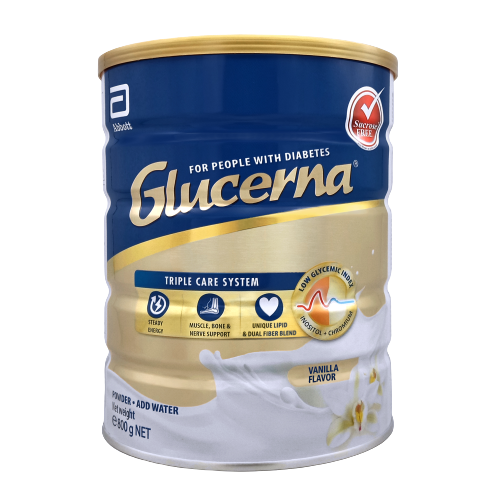Glucerna triple care
- Main Image
-

- Subtitle
- Complete and Balanced Nutrition For People with Diabetes
- Title
- Glucerna® Triple Care
- Detail Page Path
While carbs have the greatest impact on blood sugar levels, they cannot be avoided as they are the preferred fuel of the body. On average, we need between 225 and 325 grams of carbs daily, so 45 to 60 percent of the calories in your diet should come from carbs.
The main forms of carbs in our diet are starch, sugar and fibre. These carbs can be further classified as refined, simple or complex carbs.
Considered a complex carb. Food sources include wholegrains, breads, cereals, pasta and rice. Starches take longer to digest than simple sugars, but they are excellent sources of energy for endurance activities. Starches that have undergone processing are known as refined carbs. These carbs are stripped of fibre, vitamins, minerals and antioxidants and thus, typically provide little or no other nutritional value. Examples include white bread, white rice or beehoon.
Referred to as simple sugars, they are easily digested and absorbed rapidly into bloodstream. Simple sugars are quick sources of energy. Sources include fruits and juices, sugar containing desserts like cookies, cakes and cereals.
Considered a complex carb, it contributes few calories as they are not digested by the human body. Fibres come in insoluble and soluble forms and sources includes wholegrains, fruits and vegetables. Insoluble fibre (e.g. whole wheat bran) helps keep the digestive tract healthy and, soluble fibre (e.g. oats) can help lower cholesterol levels and improve blood glucose control. Fibres can also add bulk to the diet to help make one feel fuller.
For people with diabetes, opt for unrefined complex carbs more often to help better manage your blood glucose level. Unfortunately, in Singapore, the carbs we consume are mostly refined. So be smart with your food choices. Here are some tips to get carbs smart.
No matter if the carbs are complex or refined, always control the portion. Too much carbs will raise your blood sugar level quickly. The Health Promotion Board advises us to fill a quarter of our plate (every meal) with healthy carbs. This way, you can still get enough energy without over-eating. Refer to The Healthy Plate to know more!
Wholegrains are high in fibre and may help you feel fuller for longer. They also contain vitamins, minerals and phytochemicals — essential nutrients for your body. Compared to refined carbs, wholegrains may reduce the risk of heart disease. Avoid white rice and white bread whenever possible and opt for brown rice, wholemeal bread and rolled oats instead. Whole fruits and leafy vegetables are also great sources of fibres too.
Look out for foods that are tagged with the “Healthier Choice” logo, particularly those that are ‘Higher in Wholegrains’ and ‘Lower in Sugar’. These food items are smarter choices for your daily diet.
For people with diabetes, making the right carbs choices is critical to better help manage diabetes. If convenience is a priority for you, consider a diabetes-specific formula as one of your ‘smarter carbs’ food options. Such formulas are specially designed for people with diabetes to be low in Glycemic Index (GI). As they are delivered in portion controlled amounts, with every serving, you can easily control and manage the amount of carbs you are consuming while receiving complete and balanced nutrition. Consult your doctor or dietitian to find out how you can incorporate a diabetes-specific formula into your meal plan.
So, remember, simple daily choices can make a big difference. Take a step in the right direction today!
Consult your doctor for a customised diabetes management plan.
SG.2022.29988.GLU.1 (V1.1)
Stay Connected